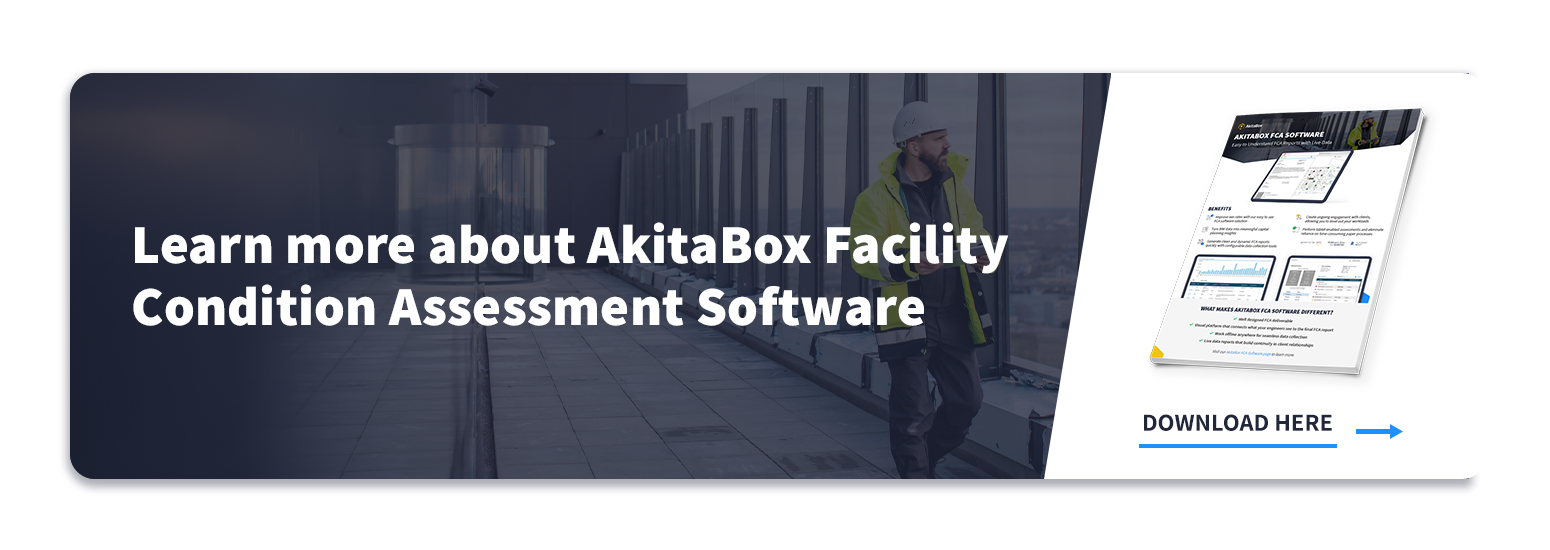You wouldn’t get a major car repair without shopping around for a few estimates and you wouldn’t buy a new product without doing research and reading customer reviews. In short, you wouldn’t try to make an important decision involving a lot of money without gathering loads of data first.
The same goes for capital planning.
What Does Good Capital Planning Require?

Before you start allocating funds to various facility improvements, you need to gather information that’ll help you determine where your budget would make the most positive impact.
Ideally, you’d want current data on the state of your facilities, including the age, condition, and estimated life span of your assets.
Compiling that information shows you:
- The benefits of moving ahead on a project
- The risks of deferring a certain project
- Which projects should take priority
However, the biggest issue in traditional facility capital planning is the lack of accurate data specific to your assets and your facilities.
That’s where a facility condition assessment comes in.
How Does an FCA Help with Capital Planning?
A facility condition assessment is a complete evaluation of your equipment, buildings, and other physical assets. Conducting an FCA compiles the information you need to determine what your facilities budget should be for the coming year. Here are 3 of the biggest ways an FCA supports smart capital planning.
An FCA Collects Accurate Data
An FCA allows you to easily log the condition of your capital equipment and track it over time. This gives you a clear picture of how well your facilities are equipped to meet the needs of the organization this year, next year, and even five years from now.
More importantly, all of this information is specific to your facility – you’re not guessing based on industry standards or general rules of thumb.
An FCA Prioritizes Projects
The accurate data captured in your FCA clearly shows you which issues should be addressed first and where you can defer. It spotlights risks you need to get ahead of so you can avoid unexpected major expenses. An FCA also identifies potential financial drains that could eat up lots of budget if not fixed.
An FCA Creates a Realistic Budget Number for Capital Planning
There’s no need to “just go with your gut” once you’re armed with your FCA results. They equip you to:
- make data-backed budget recommendations
- show the monetary risks of cutting out certain capital projects
- secure the capital you need for the future
While these are important advantages, we can just hear the groans. FCAs are difficult, manual, time consuming, and often expensive. Plus they have to be redone regularly to keep up with changes. But FCAs don’t have to suck anymore.
Not Your Father’s FCA
Ditch the clipboards and checklists – the future of FCAs is here. FCA software frees you from old-fashioned methods and the dread of annual assessments. It stores your historical data while empowering you with a treasure trove of easy-to-manage information, such as:
- Cost: See the total cost of major repairs and replacements by year. Plus, view a line-by-line breakdown of each year’s major costs.
- Risk: More effectively convey why a project should be prioritized. For example, Elevator Bank B must be upgraded this year because when it fails, the resulting lost productivity and emergency repairs will be incredibly costly. Therefore, prioritizing it now will not only save money but prevent bad press or even injury.
- Consequence: Shed some light on accumulating deferral costs. Explain the heavy toll of early asset replacement caused by a lack of proper preventive maintenance.
- Priority: Compare buildings across the entire facility portfolio and view their condition to identify investment priorities. But what if your costs exceed the available capital? Compare possible deferrals and get insight into which issues will merely affect comfort and which may lead to catastrophe.
Another neat benefit of FCA software compared to a traditional FCA is the concept of a “digital twin.” An FCA software program gathers and compiles all of your data electronically (vs. on a paper checklist). It becomes living data that can be updated and organized in any way you want. In other words, the software creates a digital twin of your physical facilities – unlike a paper FCA that becomes outdated almost as soon as it’s published.
AkitaBox’s Facility Condition Assessment software empowers you to make wise decisions about your properties and keep your budgeting projections on point. Take the guesswork out of capital planning and harness your building’s data to make better management choices. Take a virtual tour of our software.



